Nehemiah 4 meaning explained in AI Summary
Chapter 4 of Nehemiah details the escalating opposition the Jews face while rebuilding the wall of Jerusalem and how they respond with faith and strategic action.
Opposition and Ridicule (Verses 1-6):
- Sanballat and Tobiah, angered by the wall's progress, mock and ridicule the Jews, questioning their strength and resolve.
- They spread discouraging rumors, implying the wall is so weak a fox could knock it down.
- Nehemiah counters their taunts with prayer, entrusting the situation to God and asking for strength.
Conspiracy and Threats (Verses 7-14):
- The opposition escalates as Sanballat, Tobiah, and their allies conspire to attack Jerusalem and halt the construction.
- Fear spreads among the Jews as rumors of the impending attack circulate.
- Nehemiah responds with decisive action:
- He arms the people and organizes them into defensive positions along the wall.
- He delivers a stirring speech, reminding them of God's power and urging them to fight for their families and city.
Vigilance and Determination (Verses 15-23):
- The Jews remain vigilant, working on the wall with weapons at hand, ready to defend themselves.
- Nehemiah implements a system where half the people work while the other half stands guard, ensuring constant protection.
- He even instructs workers to keep their swords within reach, demonstrating their unwavering commitment to the task despite the threats.
Key Themes:
- The Power of Prayer: Nehemiah consistently turns to God in prayer when faced with opposition, finding strength and guidance.
- Faith in Action: The Jews don't just pray; they act decisively, taking practical steps to defend themselves and continue their work.
- Courage and Determination: Despite fear and threats, the Jews persevere, demonstrating remarkable courage and unwavering determination to rebuild their city and their lives.
Chapter 4 highlights the reality that rebuilding often faces opposition. However, it also showcases the power of faith, courage, and strategic action to overcome obstacles and achieve seemingly impossible goals.
Nehemiah 4 bible study ai commentary
Nehemiah chapter 4 powerfully illustrates the dynamic interplay between faith and action in the face of determined opposition. As the Jews rebuild Jerusalem's walls, their enemies, led by Sanballat and Tobiah, escalate their hostility from ridicule and psychological warfare to a violent conspiracy. Nehemiah's response models a balanced and robust faith: he immediately turns to God in imprecatory prayer, then strategically organizes the people for both construction and defense. This chapter establishes the enduring principle of the "sword and the trowel," a metaphor for the Christian life of simultaneously building God's kingdom and defending against spiritual and worldly opposition, all while maintaining absolute trust in God's sovereignty and power to fight for His people.
Nehemiah 4 Context
After the Babylonian exile, the Medo-Persian empire allowed the Jews to return to their homeland, a region now known as the Persian province of Yehud. Nehemiah, a high-ranking cupbearer to the Persian King Artaxerxes, received royal permission and resources to rebuild Jerusalem's walls, which had lain in ruins for over 140 years. This rebuilding was not just an architectural project but a crucial step in re-establishing national and religious identity, security, and worship centered in Jerusalem. The opposition came from neighboring regional governors like Sanballat the Horonite (governor of Samaria) and Tobiah the Ammonite, who saw a fortified Jerusalem as a direct threat to their own political influence and economic control. Their resistance was geopolitical, rooted in a desire to keep Jerusalem weak and subordinate.
Nehemiah 4:1-3
But when Sanballat heard that we were building the wall, he was angry and greatly enraged, and he jeered at the Jews. And he said in the presence of his brothers and of the army of Samaria, “What are these feeble Jews doing? Will they restore it for themselves? Will they sacrifice? Will they finish up in a day? Will they revive the stones out of the heaps of rubbish, and burned ones at that?” Tobiah the Ammonite was beside him, and he said, “Yes, what they are building—if a fox goes up on it he will break down their stone wall!”
In-depth-analysis
- Opposition Begins with Mockery: The first response to God's work is not violence but ridicule, a form of psychological warfare intended to demoralize.
- Sanballat's Rage: The Hebrew
kharahimplies he "burned with anger." The progress of God's people infuriated the enemy. - Series of Taunts: Sanballat's rhetorical questions are designed to sting, attacking their:
- Strength: "feeble Jews" - Highlighting their perceived weakness.
- Authority: "Will they restore it for themselves?" - Questioning their right and ability without regional approval.
- Piety: "Will they sacrifice?" - Mocking if they think divine favor can substitute for real power.
- Speed & Resources: "finish up in a day?" and "revive the stones out of... rubbish?" - Attacking the seeming impossibility of their task, using burned and brittle limestone.
- Tobiah's Insult: Tobiah's addition is climactic in its contempt. A fox is a small, light animal. He claims their wall is so flimsy that even this creature could topple it, a deep insult to their craftsmanship and effort.
Bible references
- Psa 2:1-3: Why do the nations rage and the peoples plot in vain?... against the LORD and against his Anointed... (Parallels the rage of worldly powers against God's restorative work).
- Psa 22:7: All who see me mock me; they make mouths at me; they wag their heads. (The mockery endured by God's servant, pointing ultimately to Christ).
- Lk 23:35-36: And the rulers scoffed at him, saying, “He saved others; let him save himself...” The soldiers also mocked him... (Jesus faced similar mockery, fulfilling the pattern).
Cross references
2 Kgs 18:19-25 (Sennacherib’s Rabshakeh mocking Hezekiah and God); Psa 44:13 (mocked by neighbors); Zec 4:10 (do not despise the day of small beginnings).
Nehemiah 4:4-5
Hear, O our God, for we are despised. Turn back their taunt on their own heads and give them up to be plundered in a land of captivity. Do not cover their iniquity, and do not let their sin be blotted out from your sight, for they have provoked you to anger in the presence of the builders.
In-depth-analysis
- Immediate Turn to Prayer: Nehemiah's first reaction is not to retaliate or debate but to appeal directly to God.
- Imprecatory Prayer: This is a prayer that calls for judgment on enemies. It's not personal revenge; Nehemiah asks God, the ultimate judge, to act.
- Justice, Not Vengeance: He hands the offense over to God. The logic is that the enemies "have provoked you," making this an offense against God Himself, not just the builders.
- Specific Requests: He asks God to:
- Return the insult upon them.
- Let them face plunder and captivity (the very fate the Jews had escaped).
- Hold them accountable for their sin, as it was done in defiance of God's plan.
Bible references
- Psa 109:14-15: May the iniquity of his fathers be remembered before the LORD... Let them be before the LORD continually, that he may cut off the memory of them from the earth! (A classic imprecatory psalm, showing this prayer form is part of Israel's worship).
- Rev 6:10: They cried out with a loud voice, “O Sovereign Lord, holy and true, how long before you will judge and avenge our blood on those who dwell on the earth?” (The cry of the martyrs for divine justice).
- Rom 12:19: Beloved, never avenge yourselves, but leave it to the wrath of God, for it is written, “Vengeance is mine, I will repay, says the Lord.” (Nehemiah's prayer is a perfect Old Testament outworking of this principle).
Cross references
Jer 18:23 (Jeremiah’s imprecatory prayer); Psa 79:12 (return scorn sevenfold); Psa 69:27-28 (add to their iniquity).
Nehemiah 4:6
So we built the wall. And all the wall was joined together to half its height, for the people had a mind to work.
In-depth-analysis
- Focus Despite Mockery: The mockery failed. The people ignored the taunts and continued their labor.
- Key to Success: The text explicitly states the reason for their rapid progress: "the people had a mind to work" (
lev la’asot). This indicates wholehearted, unified, and zealous commitment. Their morale was high. - Significant Progress: Reaching "half its height" was a critical tipping point. It made the project look viable and permanent, which is what provoked the next, more serious stage of opposition.
Bible references
- Col 3:23: Whatever you do, work heartily, as for the Lord and not for men. (Describes the heart attitude of the builders).
- Exo 36:2: And Moses called Bezalel and Oholiab and every craftsman in whose mind the LORD had put skill... whose heart stirred him up to come to the work to do it. (Parallels the divinely-motivated spirit for God's construction projects).
Cross references
1 Chr 29:3-9 (giving willingly for the temple); 2 Chr 24:13 (work progressed).
Nehemiah 4:7-9
But when Sanballat and Tobiah and the Arabs and the Ammonites and the Ashdodites heard that the repairing of the walls of Jerusalem was going forward and that the breaches were beginning to be closed, they were very angry. And they all plotted together to come and fight against Jerusalem and to cause confusion in it. And we prayed to our God and set a guard as a protection against them day and night.
In-depth-analysis
- Escalated Opposition: As the work progresses, the opposition intensifies from mockery to a military conspiracy.
- Enemy Alliance: The circle of enemies widens, geographically surrounding Jerusalem: Arabs (south), Ammonites (east), and Ashdodites (west), led by Sanballat (north). This was a coordinated, regional threat.
- Goal: "Cause Confusion": Their aim was not just destruction but to create chaos, panic, and internal disorder to halt the project.
- The Nehemiah Principle (Prayer + Action): Here lies the central theme of the chapter. Their response is perfectly balanced: "we prayed to our God" AND "set a guard." Faith in God does not lead to passivity but to wise, practical action.
Bible references
- Mat 26:41: Watch and pray that you may not enter into temptation. (Jesus commands the same dual response of spiritual dependence and practical vigilance).
- Eph 6:18: praying at all times in the Spirit... To that end, keep alert with all perseverance... (Describes the posture of a Christian soldier: constant prayer and alertness).
- Psa 2:2: The kings of the earth set themselves, and the rulers take counsel together, against the LORD... (A direct parallel of earthly powers conspiring against God's agenda).
Cross references
Psa 83:3-5 (conspiracy against Israel); Acts 4:24-26 (early church prays against opposition); 2 Chr 20:1-12 (Jehoshaphat facing an alliance).
Nehemiah 4:10-12
In Judah it was said, “The strength of the burden-bearers is failing, and there is much rubbish. We are not able to work on the wall.” And our enemies said, “They will not know or see till we come among them and kill them and stop the work.” At that time the Jews who lived near them came from all directions and said to us ten times, “You must return to us.”
In-depth-analysis
- Internal Threat: Discouragement: The second attack is internal. The people of Judah themselves begin to lose heart.
- Reasons for Demoralization:
- Exhaustion: "The strength... is failing." The physical toll was immense.
- Overwhelm: "there is much rubbish." The task still seemed insurmountable.
- Fear: Their enemies planned a surprise attack.
- Constant Warnings: The phrase "ten times" is a Hebrew idiom for "repeatedly and insistently." Jews living in outlying villages, near the enemies, kept bringing reports of the danger, creating a climate of fear. Their plea "You must return to us" can be interpreted as either a warning to retreat to the safety of their villages or a plea for the builders to come protect them. Either way, it was a drain on morale.
Bible references
- Num 13:31-33: But the men who had gone up with him said, “We are not able to go up against the people, for they are stronger than we are.” (Parallels how an internal report of enemy strength caused the people's hearts to melt).
- Isa 40:29: He gives power to the faint, and to him who has no might he increases strength. (The divine answer to the very problem described in this verse).
Cross references
Deut 1:28 (our brothers have made our hearts melt); Hab 2:4 (the righteous shall live by faith); Gal 6:9 (do not grow weary in doing good).
Nehemiah 4:13-14
So in the lowest parts of the space behind the wall, in the open places, I stationed the people by their clans, with their swords, their spears, and their bows. And I looked and arose and said to the nobles and to the officials and to the rest of the people, “Do not be afraid of them. Remember the Lord, who is great and awesome, and fight for your brothers, your sons, your daughters, your wives, and your homes.”
In-depth-analysis
- Decisive Leadership: Nehemiah counters discouragement with strategy and inspiration.
- Strategic Placement: He places guards at the "lowest parts" and "open places"—the most vulnerable points of the wall.
- Fighting by Families (
mishpachah): This was a brilliant move. Organizing the defense by clans and families gave them the highest possible motivation: they were directly protecting their own loved ones. - Nehemiah's Speech: A masterclass in leadership exhortation.
- Counter Fear: "Do not be afraid of them." (A common biblical command).
- Direct Focus to God: "Remember the Lord, who is great and awesome." The solution to fear is a right view of God's power.
- Provide Motivation: "fight for your..." This connects their divine purpose to their most personal and visceral responsibilities.
Bible references
- Deut 20:3-4: “...Let not your heart faint... Do not be frightened... for the LORD your God is he who goes with you to fight for you...” (The charge given to Israel before battle, which Nehemiah echoes).
- Eph 6:10: Finally, be strong in the Lord and in the strength of his might. (The New Testament equivalent of remembering the "great and awesome" Lord).
- 2 Sam 10:12: Be of good courage, and let us be courageous for our people, and for the cities of our God, and may the LORD do what seems good to him. (Joab's similar speech before battle).
Cross references
Exo 14:13 (fear not, stand firm); Deut 1:29-30 (The Lord will fight for you); Jos 1:9 (be strong and courageous).
Nehemiah 4:15-18
And when our enemies heard that it was known to us and that God had frustrated their plan, we all returned to the wall, each to his work. From that day on, half of my servants worked on construction, and half held the spears, shields, bows, and coats of mail. And the leaders stood behind the whole house of Judah, who were building on the wall. Those who carried burdens were loaded in such a way that each labored on the work with one hand and held his weapon with the other. And each of the builders had his sword strapped at his side while he built.
In-depth-analysis
- Plot Frustrated: The secrecy of the enemy's plot was their main advantage. Once it was known and the Jews were prepared, the plan was thwarted. Nehemiah rightly gives God the credit: "God had frustrated their plan."
- The Sword and Trowel: This is the iconic image of the chapter. They return to work, but with a new system of constant military readiness.
- Organized Defense:
- Half-and-Half System: Half work, half guard. A practical solution to the need for both progress and protection.
- Leaders as Rearguard: The leaders provided support and security, showing solidarity with the workers.
- Armed Laborers: Even those building and carrying materials were armed, symbolizing a life of service and warfare combined.
One hand... the other: This powerful image shows that building and battling are not sequential but simultaneous tasks for God's people.
Bible references
- Eph 6:11-17: Put on the whole armor of God... stand therefore... with the sword of the Spirit... (This passage is the New Testament theological counterpart to Nehemiah's practical actions, describing the spiritual armor needed for Christian life and warfare).
- 1 Cor 16:13: Be watchful, stand firm in the faith, act like men, be strong. (Encapsulates the attitude of the builders).
Polemics
Some scholars point out that this is not a pacifist response, challenging a theology that rejects any form of self-defense. Nehemiah's actions are presented as wise, godly, and necessary. The integration of spiritual trust (God frustrated their plan) and militaristic pragmatism (every man armed) is seen as a model, not a contradiction.
Nehemiah 4:19-20
And I said to the nobles and to the officials and to the rest of the people, “The work is great and widely spread, and we are separated on the wall, far from one another. In the place where you hear the sound of the trumpet, rally to us there. Our God will fight for us.”
In-depth-analysis
- Communication System: Nehemiah addresses the logistical problem of being "far from one another." The trumpet was the ancient world's signal technology for mass communication in battle.
- Rallying Point: The trumpet creates a point of unity and a rapid-response system. It ensures that no section would be left to fight alone.
- Ultimate Confidence: After laying out all the practical, military strategies, Nehemiah concludes with the foundation of their hope: "Our God will fight for us." Their strategy was not a substitute for faith, but an expression of it.
Bible references
- Exo 14:14: The LORD will fight for you, and you have only to be silent. (Nehemiah quotes the foundational promise given at the Red Sea).
- Num 10:9: And when you go to war in your land against the adversary... then you shall blow an alarm with the trumpets. Then you will be remembered before the LORD your God, and you will be saved from your enemies. (Directly connects the trumpet blast with invoking God's promise to fight for Israel).
- 1 Cor 15:52: In a moment, in the twinkling of an eye, at the last trumpet. For the trumpet will sound, and the dead will be raised... (The trumpet in the NT is the ultimate rally call for God's people at the final victory).
Cross references
Deut 20:4; Jos 23:10; 2 Chr 20:17; 1 Thes 4:16 (the trumpet of God).
Nehemiah 4:21-23
So we labored at the work, and half of them held the spears from the break of dawn until the stars came out. I also said to the people at that time, “Let every man and his servant pass the night inside Jerusalem, that they may be a guard for us by night and may labor by day.” So neither I nor my brothers nor my servants nor the men of the guard who followed me, none of us took off our clothes; each kept his weapon at his right hand.
In-depth-analysis
- Unyielding Dedication: This passage emphasizes the totality of their commitment. They worked from dawn until nightfall.
- Security Measures: Forcing everyone to lodge inside Jerusalem at night both protected the workers and bolstered the city's overnight defense force.
- Constant Vigilance: The detail that "none of us took off our clothes" illustrates a state of perpetual readiness. It's a powerful picture of sacrifice and alertness.
- The Weapon at Hand: The final phrase (translated differently in some manuscripts as "each his weapon for the water") reinforces the theme: even in the most basic of activities, they remained prepared for a fight. They lived in a state of alert readiness.
Bible references
- 1 Pet 5:8: Be sober-minded; be watchful. Your adversary the devil prowls around like a roaring lion, seeking someone to devour. (The New Testament call for the same constant spiritual vigilance shown by Nehemiah).
- Lk 12:35-36: “Stay dressed for action and keep your lamps burning, and be like men who are waiting for their master to come...” (Christ's command for readiness for His return mirrors the builders' posture).
- Judg 7:5-6: (Gideon's test) ...everyone who laps the water with his tongue, as a dog laps... everyone who kneels down to drink... (Evokes a similar theme of warriors staying alert even while meeting basic needs).
Cross references
2 Tim 2:3 (share in suffering as a good soldier); 1 Cor 9:26-27 (disciplining the body).
Nehemiah Chapter 4 Analysis
- Prayer is the First Response, Not the Last Resort: In the face of both psychological and physical threats (v. 4, v. 9), Nehemiah’s immediate instinct is to turn to God. This sets the foundation for all subsequent action.
- Faith Fuels Practicality: The chapter powerfully refutes any idea that faith is passive. Nehemiah's trust in God ("Our God will fight for us") did not lead him to dismiss the threat, but to organize guards, arm workers, and create a communication system. True faith works (Jas 2:17).
- Leadership in Crisis: Nehemiah models exemplary leadership. He assesses the threat, prays, organizes, exhorts, and personally participates in the hardship ("So neither I nor my brothers..."). He addresses both spiritual (fear) and practical (vulnerability) problems.
- The Symbiosis of Building and Battling: The "sword and trowel" is an enduring biblical metaphor for the life of faith. The people of God are always called to be building up the kingdom (making disciples, loving neighbors, creating good) while simultaneously being armed for and engaged in spiritual warfare against opposition (Eph 6:10-18). These two tasks are inseparable.
Nehemiah 4 Summary
Faced with escalating opposition that moves from ridicule to a military conspiracy, Nehemiah leads the Jews to counter the threat not with fear, but with a strategy of fervent prayer and intense, practical vigilance. By arming the builders and organizing a system of defense, they continue the work on the wall, embodying the principle of holding a trowel in one hand and a sword in the other, demonstrating that faith in God empowers rather than replaces diligent action and readiness.
Nehemiah 4 AI Image Audio and Video
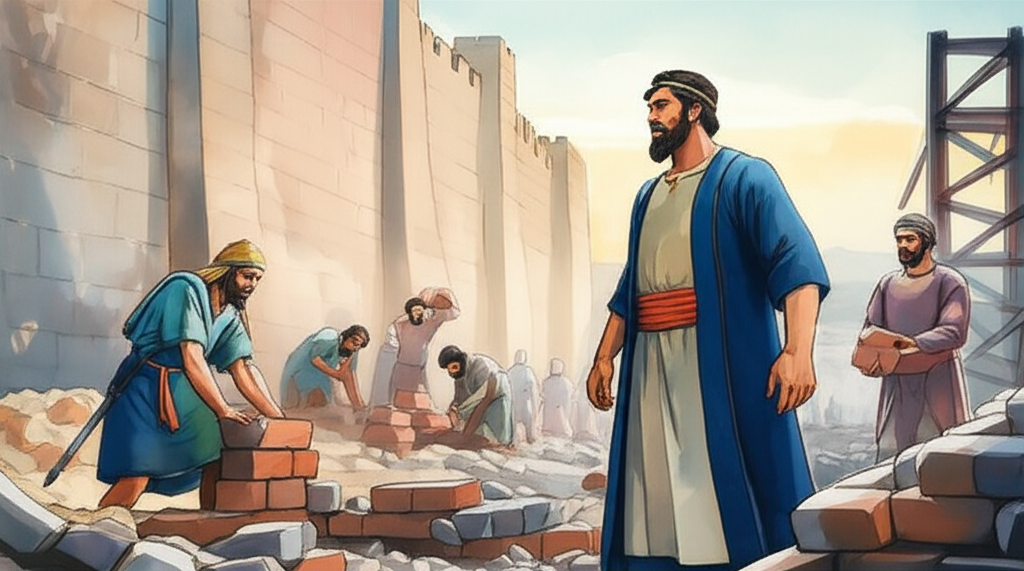

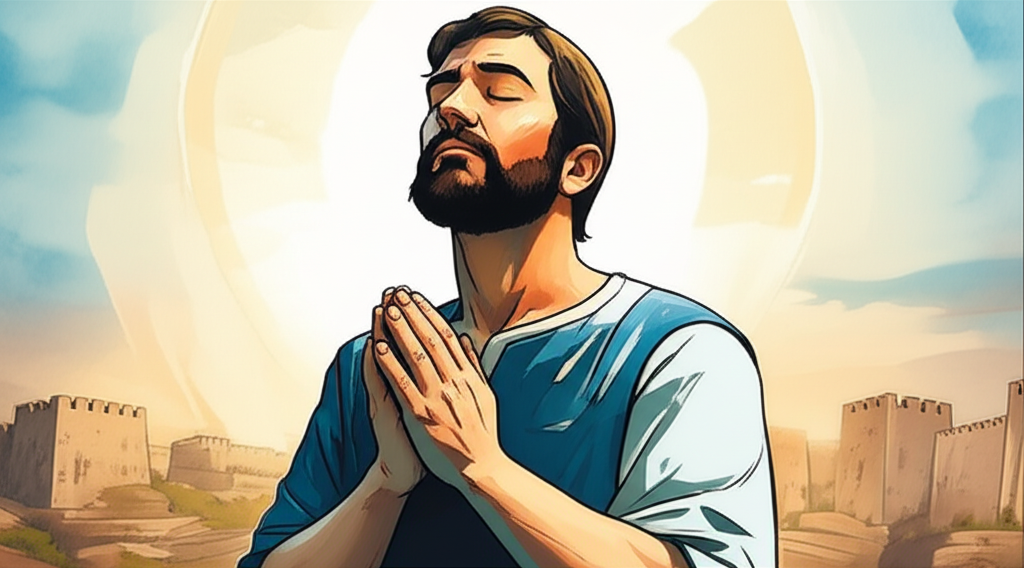
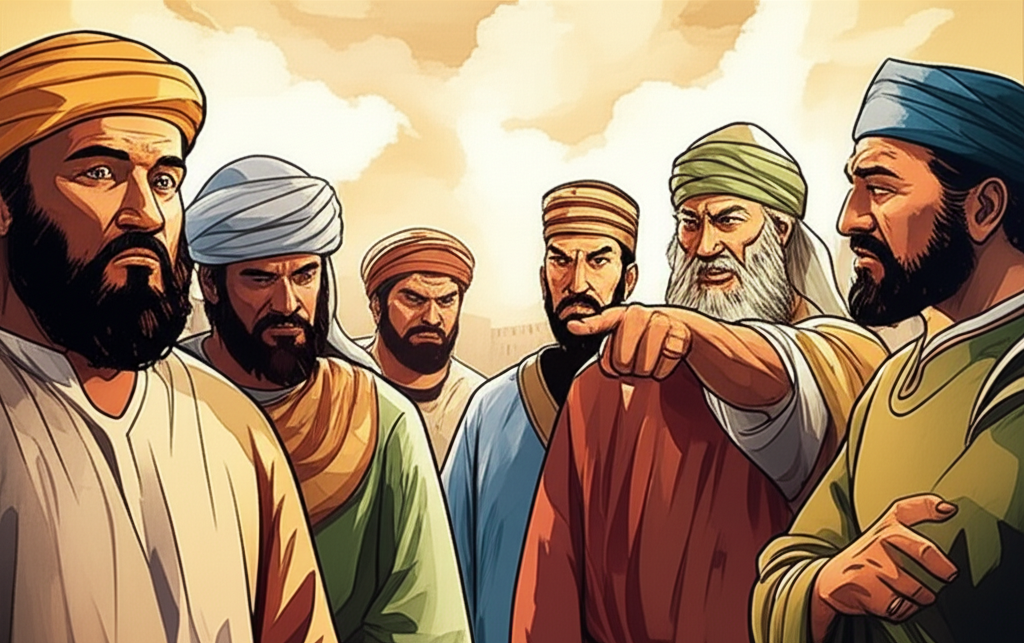

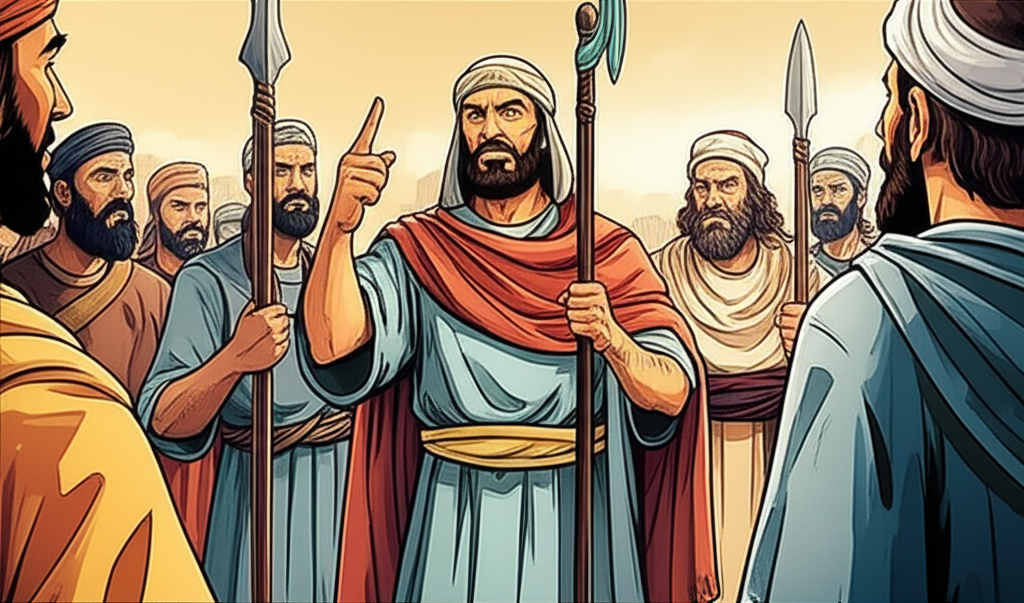
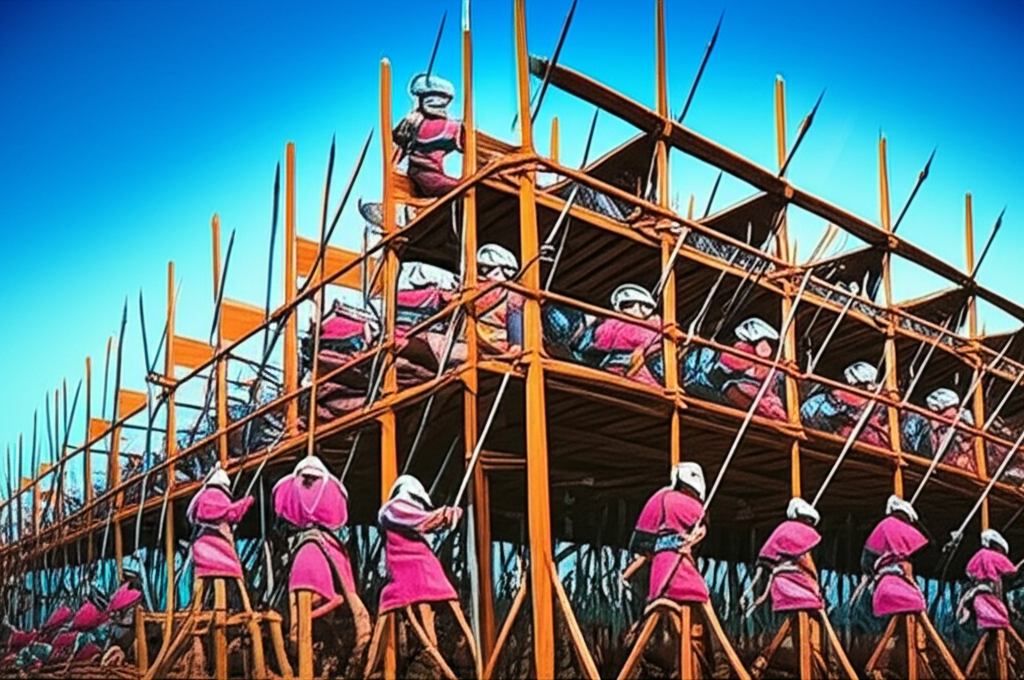
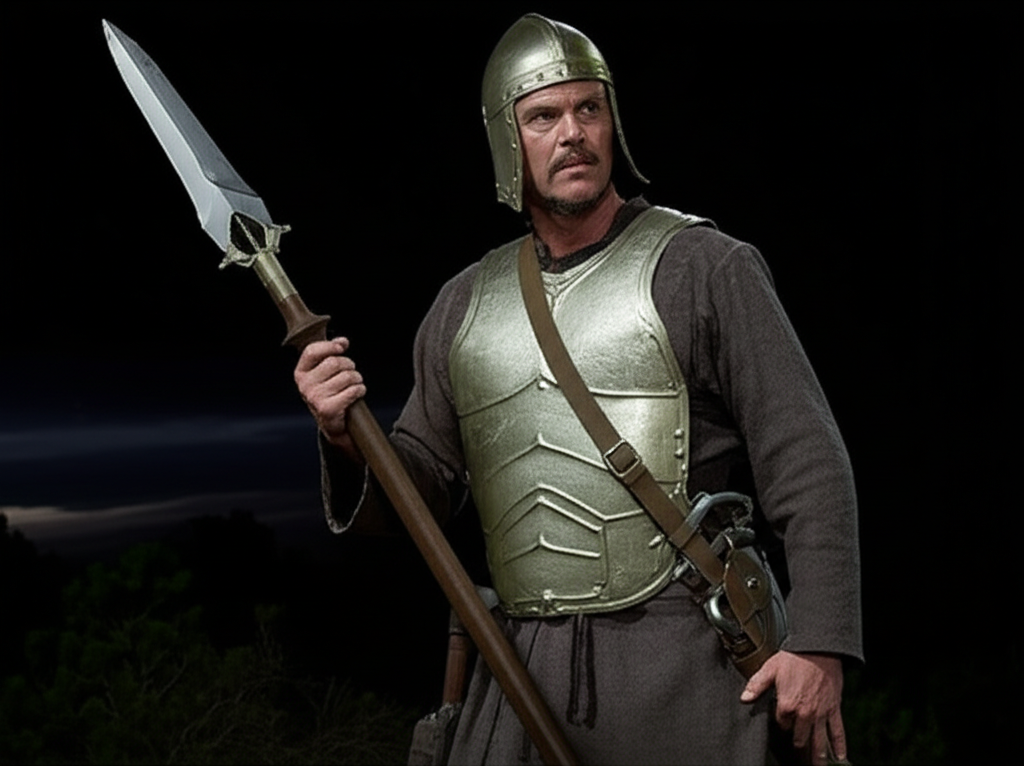
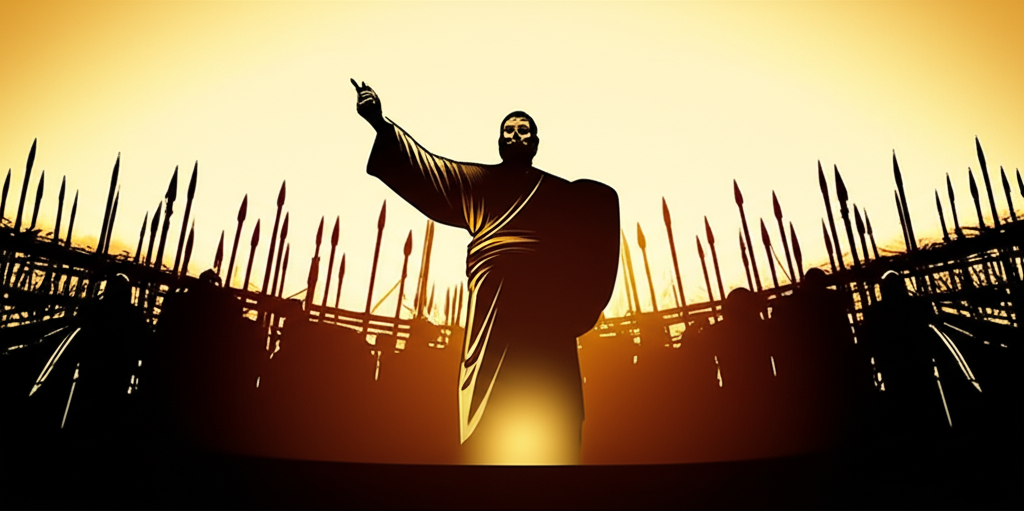
Nehemiah chapter 4 kjv
- 1 But it came to pass, that when Sanballat heard that we builded the wall, he was wroth, and took great indignation, and mocked the Jews.
- 2 And he spake before his brethren and the army of Samaria, and said, What do these feeble Jews? will they fortify themselves? will they sacrifice? will they make an end in a day? will they revive the stones out of the heaps of the rubbish which are burned?
- 3 Now Tobiah the Ammonite was by him, and he said, Even that which they build, if a fox go up, he shall even break down their stone wall.
- 4 Hear, O our God; for we are despised: and turn their reproach upon their own head, and give them for a prey in the land of captivity:
- 5 And cover not their iniquity, and let not their sin be blotted out from before thee: for they have provoked thee to anger before the builders.
- 6 So built we the wall; and all the wall was joined together unto the half thereof: for the people had a mind to work.
- 7 But it came to pass, that when Sanballat, and Tobiah, and the Arabians, and the Ammonites, and the Ashdodites, heard that the walls of Jerusalem were made up, and that the breaches began to be stopped, then they were very wroth,
- 8 And conspired all of them together to come and to fight against Jerusalem, and to hinder it.
- 9 Nevertheless we made our prayer unto our God, and set a watch against them day and night, because of them.
- 10 And Judah said, The strength of the bearers of burdens is decayed, and there is much rubbish; so that we are not able to build the wall.
- 11 And our adversaries said, They shall not know, neither see, till we come in the midst among them, and slay them, and cause the work to cease.
- 12 And it came to pass, that when the Jews which dwelt by them came, they said unto us ten times, From all places whence ye shall return unto us they will be upon you.
- 13 Therefore set I in the lower places behind the wall, and on the higher places, I even set the people after their families with their swords, their spears, and their bows.
- 14 And I looked, and rose up, and said unto the nobles, and to the rulers, and to the rest of the people, Be not ye afraid of them: remember the LORD, which is great and terrible, and fight for your brethren, your sons, and your daughters, your wives, and your houses.
- 15 And it came to pass, when our enemies heard that it was known unto us, and God had brought their counsel to nought, that we returned all of us to the wall, every one unto his work.
- 16 And it came to pass from that time forth, that the half of my servants wrought in the work, and the other half of them held both the spears, the shields, and the bows, and the habergeons; and the rulers were behind all the house of Judah.
- 17 They which builded on the wall, and they that bare burdens, with those that laded, every one with one of his hands wrought in the work, and with the other hand held a weapon.
- 18 For the builders, every one had his sword girded by his side, and so builded. And he that sounded the trumpet was by me.
- 19 And I said unto the nobles, and to the rulers, and to the rest of the people, The work is great and large, and we are separated upon the wall, one far from another.
- 20 In what place therefore ye hear the sound of the trumpet, resort ye thither unto us: our God shall fight for us.
- 21 So we laboured in the work: and half of them held the spears from the rising of the morning till the stars appeared.
- 22 Likewise at the same time said I unto the people, Let every one with his servant lodge within Jerusalem, that in the night they may be a guard to us, and labour on the day.
- 23 So neither I, nor my brethren, nor my servants, nor the men of the guard which followed me, none of us put off our clothes, saving that every one put them off for washing.
Nehemiah chapter 4 nkjv
- 1 But it so happened, when Sanballat heard that we were rebuilding the wall, that he was furious and very indignant, and mocked the Jews.
- 2 And he spoke before his brethren and the army of Samaria, and said, "What are these feeble Jews doing? Will they fortify themselves? Will they offer sacrifices? Will they complete it in a day? Will they revive the stones from the heaps of rubbish?stones that are burned?"
- 3 Now Tobiah the Ammonite was beside him, and he said, "Whatever they build, if even a fox goes up on it, he will break down their stone wall."
- 4 Hear, O our God, for we are despised; turn their reproach on their own heads, and give them as plunder to a land of captivity!
- 5 Do not cover their iniquity, and do not let their sin be blotted out from before You; for they have provoked You to anger before the builders.
- 6 So we built the wall, and the entire wall was joined together up to half its height, for the people had a mind to work.
- 7 Now it happened, when Sanballat, Tobiah, the Arabs, the Ammonites, and the Ashdodites heard that the walls of Jerusalem were being restored and the gaps were beginning to be closed, that they became very angry,
- 8 and all of them conspired together to come and attack Jerusalem and create confusion.
- 9 Nevertheless we made our prayer to our God, and because of them we set a watch against them day and night.
- 10 Then Judah said, "The strength of the laborers is failing, and there is so much rubbish that we are not able to build the wall."
- 11 And our adversaries said, "They will neither know nor see anything, till we come into their midst and kill them and cause the work to cease."
- 12 So it was, when the Jews who dwelt near them came, that they told us ten times, "From whatever place you turn, they will be upon us."
- 13 Therefore I positioned men behind the lower parts of the wall, at the openings; and I set the people according to their families, with their swords, their spears, and their bows.
- 14 And I looked, and arose and said to the nobles, to the leaders, and to the rest of the people, "Do not be afraid of them. Remember the Lord, great and awesome, and fight for your brethren, your sons, your daughters, your wives, and your houses."
- 15 And it happened, when our enemies heard that it was known to us, and that God had brought their plot to nothing, that all of us returned to the wall, everyone to his work.
- 16 So it was, from that time on, that half of my servants worked at construction, while the other half held the spears, the shields, the bows, and wore armor; and the leaders were behind all the house of Judah.
- 17 Those who built on the wall, and those who carried burdens, loaded themselves so that with one hand they worked at construction, and with the other held a weapon.
- 18 Every one of the builders had his sword girded at his side as he built. And the one who sounded the trumpet was beside me.
- 19 Then I said to the nobles, the rulers, and the rest of the people, "The work is great and extensive, and we are separated far from one another on the wall.
- 20 Wherever you hear the sound of the trumpet, rally to us there. Our God will fight for us."
- 21 So we labored in the work, and half of the men held the spears from daybreak until the stars appeared.
- 22 At the same time I also said to the people, "Let each man and his servant stay at night in Jerusalem, that they may be our guard by night and a working party by day."
- 23 So neither I, my brethren, my servants, nor the men of the guard who followed me took off our clothes, except that everyone took them off for washing.
Nehemiah chapter 4 niv
- 1 When Sanballat heard that we were rebuilding the wall, he became angry and was greatly incensed. He ridiculed the Jews,
- 2 and in the presence of his associates and the army of Samaria, he said, "What are those feeble Jews doing? Will they restore their wall? Will they offer sacrifices? Will they finish in a day? Can they bring the stones back to life from those heaps of rubble?burned as they are?"
- 3 Tobiah the Ammonite, who was at his side, said, "What they are building?even a fox climbing up on it would break down their wall of stones!"
- 4 Hear us, our God, for we are despised. Turn their insults back on their own heads. Give them over as plunder in a land of captivity.
- 5 Do not cover up their guilt or blot out their sins from your sight, for they have thrown insults in the face of the builders.
- 6 So we rebuilt the wall till all of it reached half its height, for the people worked with all their heart.
- 7 But when Sanballat, Tobiah, the Arabs, the Ammonites and the people of Ashdod heard that the repairs to Jerusalem's walls had gone ahead and that the gaps were being closed, they were very angry.
- 8 They all plotted together to come and fight against Jerusalem and stir up trouble against it.
- 9 But we prayed to our God and posted a guard day and night to meet this threat.
- 10 Meanwhile, the people in Judah said, "The strength of the laborers is giving out, and there is so much rubble that we cannot rebuild the wall."
- 11 Also our enemies said, "Before they know it or see us, we will be right there among them and will kill them and put an end to the work."
- 12 Then the Jews who lived near them came and told us ten times over, "Wherever you turn, they will attack us."
- 13 Therefore I stationed some of the people behind the lowest points of the wall at the exposed places, posting them by families, with their swords, spears and bows.
- 14 After I looked things over, I stood up and said to the nobles, the officials and the rest of the people, "Don't be afraid of them. Remember the Lord, who is great and awesome, and fight for your families, your sons and your daughters, your wives and your homes."
- 15 When our enemies heard that we were aware of their plot and that God had frustrated it, we all returned to the wall, each to our own work.
- 16 From that day on, half of my men did the work, while the other half were equipped with spears, shields, bows and armor. The officers posted themselves behind all the people of Judah
- 17 who were building the wall. Those who carried materials did their work with one hand and held a weapon in the other,
- 18 and each of the builders wore his sword at his side as he worked. But the man who sounded the trumpet stayed with me.
- 19 Then I said to the nobles, the officials and the rest of the people, "The work is extensive and spread out, and we are widely separated from each other along the wall.
- 20 Wherever you hear the sound of the trumpet, join us there. Our God will fight for us!"
- 21 So we continued the work with half the men holding spears, from the first light of dawn till the stars came out.
- 22 At that time I also said to the people, "Have every man and his helper stay inside Jerusalem at night, so they can serve us as guards by night and as workers by day."
- 23 Neither I nor my brothers nor my men nor the guards with me took off our clothes; each had his weapon, even when he went for water.
Nehemiah chapter 4 esv
- 1 Now when Sanballat heard that we were building the wall, he was angry and greatly enraged, and he jeered at the Jews.
- 2 And he said in the presence of his brothers and of the army of Samaria, "What are these feeble Jews doing? Will they restore it for themselves? Will they sacrifice? Will they finish up in a day? Will they revive the stones out of the heaps of rubbish, and burned ones at that?"
- 3 Tobiah the Ammonite was beside him, and he said, "Yes, what they are building ? if a fox goes up on it he will break down their stone wall!"
- 4 Hear, O our God, for we are despised. Turn back their taunt on their own heads and give them up to be plundered in a land where they are captives.
- 5 Do not cover their guilt, and let not their sin be blotted out from your sight, for they have provoked you to anger in the presence of the builders.
- 6 So we built the wall. And all the wall was joined together to half its height, for the people had a mind to work.
- 7 But when Sanballat and Tobiah and the Arabs and the Ammonites and the Ashdodites heard that the repairing of the walls of Jerusalem was going forward and that the breaches were beginning to be closed, they were very angry.
- 8 And they all plotted together to come and fight against Jerusalem and to cause confusion in it.
- 9 And we prayed to our God and set a guard as a protection against them day and night.
- 10 In Judah it was said, "The strength of those who bear the burdens is failing. There is too much rubble. By ourselves we will not be able to rebuild the wall."
- 11 And our enemies said, "They will not know or see till we come among them and kill them and stop the work."
- 12 At that time the Jews who lived near them came from all directions and said to us ten times, "You must return to us."
- 13 So in the lowest parts of the space behind the wall, in open places, I stationed the people by their clans, with their swords, their spears, and their bows.
- 14 And I looked and arose and said to the nobles and to the officials and to the rest of the people, "Do not be afraid of them. Remember the Lord, who is great and awesome, and fight for your brothers, your sons, your daughters, your wives, and your homes."
- 15 When our enemies heard that it was known to us and that God had frustrated their plan, we all returned to the wall, each to his work.
- 16 From that day on, half of my servants worked on construction, and half held the spears, shields, bows, and coats of mail. And the leaders stood behind the whole house of Judah,
- 17 who were building on the wall. Those who carried burdens were loaded in such a way that each labored on the work with one hand and held his weapon with the other.
- 18 And each of the builders had his sword strapped at his side while he built. The man who sounded the trumpet was beside me.
- 19 And I said to the nobles and to the officials and to the rest of the people, "The work is great and widely spread, and we are separated on the wall, far from one another.
- 20 In the place where you hear the sound of the trumpet, rally to us there. Our God will fight for us."
- 21 So we labored at the work, and half of them held the spears from the break of dawn until the stars came out.
- 22 I also said to the people at that time, "Let every man and his servant pass the night within Jerusalem, that they may be a guard for us by night and may labor by day."
- 23 So neither I nor my brothers nor my servants nor the men of the guard who followed me, none of us took off our clothes; each kept his weapon at his right hand.
Nehemiah chapter 4 nlt
- 1 Sanballat was very angry when he learned that we were rebuilding the wall. He flew into a rage and mocked the Jews,
- 2 saying in front of his friends and the Samarian army officers, "What does this bunch of poor, feeble Jews think they're doing? Do they think they can build the wall in a single day by just offering a few sacrifices? Do they actually think they can make something of stones from a rubbish heap ? and charred ones at that?"
- 3 Tobiah the Ammonite, who was standing beside him, remarked, "That stone wall would collapse if even a fox walked along the top of it!"
- 4 Then I prayed, "Hear us, our God, for we are being mocked. May their scoffing fall back on their own heads, and may they themselves become captives in a foreign land!
- 5 Do not ignore their guilt. Do not blot out their sins, for they have provoked you to anger here in front of the builders."
- 6 At last the wall was completed to half its height around the entire city, for the people had worked with enthusiasm.
- 7 But when Sanballat and Tobiah and the Arabs, Ammonites, and Ashdodites heard that the work was going ahead and that the gaps in the wall of Jerusalem were being repaired, they were furious.
- 8 They all made plans to come and fight against Jerusalem and throw us into confusion.
- 9 But we prayed to our God and guarded the city day and night to protect ourselves.
- 10 Then the people of Judah began to complain, "The workers are getting tired, and there is so much rubble to be moved. We will never be able to build the wall by ourselves."
- 11 Meanwhile, our enemies were saying, "Before they know what's happening, we will swoop down on them and kill them and end their work."
- 12 The Jews who lived near the enemy came and told us again and again, "They will come from all directions and attack us!"
- 13 So I placed armed guards behind the lowest parts of the wall in the exposed areas. I stationed the people to stand guard by families, armed with swords, spears, and bows.
- 14 Then as I looked over the situation, I called together the nobles and the rest of the people and said to them, "Don't be afraid of the enemy! Remember the Lord, who is great and glorious, and fight for your brothers, your sons, your daughters, your wives, and your homes!"
- 15 When our enemies heard that we knew of their plans and that God had frustrated them, we all returned to our work on the wall.
- 16 But from then on, only half my men worked while the other half stood guard with spears, shields, bows, and coats of mail. The leaders stationed themselves behind the people of Judah
- 17 who were building the wall. The laborers carried on their work with one hand supporting their load and one hand holding a weapon.
- 18 All the builders had a sword belted to their side. The trumpeter stayed with me to sound the alarm.
- 19 Then I explained to the nobles and officials and all the people, "The work is very spread out, and we are widely separated from each other along the wall.
- 20 When you hear the blast of the trumpet, rush to wherever it is sounding. Then our God will fight for us!"
- 21 We worked early and late, from sunrise to sunset. And half the men were always on guard.
- 22 I also told everyone living outside the walls to stay in Jerusalem. That way they and their servants could help with guard duty at night and work during the day.
- 23 During this time, none of us ? not I, nor my relatives, nor my servants, nor the guards who were with me ? ever took off our clothes. We carried our weapons with us at all times, even when we went for water.
- Bible Book of Nehemiah
- 1 Report from Jerusalem
- 2 Nehemiah Sent to Judah
- 3 Rebuilding the Wall
- 4 Opposition to the Work
- 5 Nehemiah Stops Oppression of the Poor
- 6 Conspiracy Against Nehemiah
- 7 Lists of Returned Exiles
- 8 Ezra Reads the Law
- 9 The People of Israel Confess Their Sin
- 10 The People Who Sealed the Covenant
- 11 The Leaders in Jerusalem
- 12 Priests and Levites
- 13 Nehemiah's Final Reforms